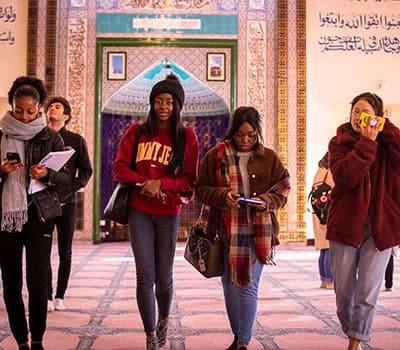Sociology research
Our sociology research is conducted by a vibrant community of academics and research students.
Sociology research is organised into three world-class research clusters: Intersectionalities and citizenship, Digital and health technologies and Consumption, culture and inequalities.
We collaborate across our School, in particular with colleagues in Communication and Media, the university, nationally and internationally. The social impact of our work ranges from giving evidence to House of Lords on the timely topic of religion and gender to working with craft beer breweries and seeking to reduce antibiotic use in hospitals.

Intersectionalities and citizenship
Lead: Prof Line Nyhagen
Social identities such as gender, sexuality, race and ethnicity, religion, age and disability can empower and mobilise people to action, but societal structures, hegemonic norms and power relations also work to marginalise and oppress different constituencies and individuals. Researchers within this theme examine how intersections between social identities influence and are influenced by societal processes such as migration, nationalism, social cohesion, collective movements and citizenship practises. Research in this cluster intersects with research in Centre for Research in Communication and Culture.

Digital and health technologies
Lead: Prof Paula Saukko
Digital and other new technologies are changing individuals’ social interactions and identities, healthcare systems and practices, cultural institutions, inequalities and economic and financial structures and processes. Drawing on Science and Technology Studies (STS), Critical Realism and classical theories in sociology and medical sociology, researchers in this cluster investigate how new technologies are changing our everyday lives and practices, healthcare and cultural institutions and the operations of global economies and finance. Research in this cluster intersects with research in Centre for Research in Communication and Culture and the Sport, Health and Wellbeing Research Challenge.

Consumption, culture and inequalities
Lead: Dr Thomas Thurnell-Read
Researchers working within this cluster explore the processes by which consumption practices and cultural engagements are shaped by and influence upon social identities and structural inequalities. Exploring how cultural preferences and consumer habits unfold within the everyday lives of individuals, groups and communities reveals complex dynamics of freedom and constraint. Research in this area informs public and policy debates about consumption, culture and lifestyles as sites of belonging and self-expression as well as poverty, inequality and social exclusion. Research in this cluster intersects with research in Centre for Research in Communication and Culture and Centre for Research in Social Policy.